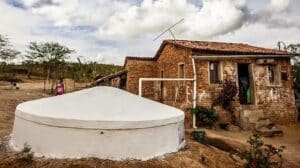The 'Aqualuz' project, which deals with cistern water captured by rain technology in the semi-arid region of Bahia, at a low cost. Thus, it was the subject of the interview with the young scientist Anna Luísa Beserra, on the program ' Isso é Bahia, on the radio station A TARDE FM.
During the conversation with presenters Jefferson Beltrão and Fernando Duarte, she explained how she works in the development of projects to bring water to needy populations.
Asked how her interest in science came about, Anna Luísa, who is 22 years old, explained that she has been interested in the area since she was a child. “I don't have a starting point, because since I was a child I've always liked science and imagined being a technology scientist in the future. I used to joke that I was a scientist, doing experiments”, he pointed out.

Living conditions
About the project he develops, which contributes to the population of Bahia and other states to have better living conditions. Therefore, the scientist claims that the idea for the device came up in her teens.
“I saw a poster for 'Young Scientist' by CNPQ (National Council for Scientific and Technological Development), whose theme was 'Water'. At the same time, I was studying how big and serious the problem of drought and lack of access to water was here in our semi-arid region, which was so close to me, despite the fact that I was born and raised in Salvador and had never experienced this need.
So, uniting my desire to be a scientist and do something to change the world, with this opportunity to participate in the prize on water, I tried to look for some technology that was really viable, because we know that there are technologies for water all around, only that most of them are not aimed at the public that is isolated there, often without access to energy.
So, my starting point was to find something that could really be viable for that region”, he pointed out.
Agualuz
The device 'Agualuz', awarded by the United Nations (UN), operates in the disinfection of rainwater collection cistern water through solar radiation. The project is an alternative for independent access to drinking water for those who need it most in the rural area.
“In the semi-arid region there is a technology called 'cistern', which captures and stores rainwater, and this guarantees very good water quality for the population when it rains, of course.
However, due to some maintenance problems and even the staff, sometimes they are unable to properly clean the cistern, this water ends up receiving microbiological contamination, which are bacteria and viruses that cause diseases.
So, based on this situation, there is a cistern, with rainwater, but with exclusively microbiological contamination, the sun, solar radiation, ultraviolet, infrared that will kill these microorganisms,” he said.
Reach
According to Anna Luisa, the aim is to expand services in the semi-arid region and reach more people. “We already serve more than 250 families here in Brazil, in five states. The idea is that we can serve more than one million families, which is more or less the number of cisterns that have here in the Brazilian semi-arid region”, he explained.
The project is currently running a campaign that aims to make water treatment available outside the country and improve the lives of the African population. The scientist informed that the campaign is to bring quality water to Madagascar.
“Now we have a campaign launched for Africa. This year, we intend to go at least to Madagascar, a very poor community that doesn't even have water to shower.
We have this campaign open to anyone who wants to contribute, this STW for Africa. You can find it on Instagram and also through our website. The campaign is open on Kickante, which is to bring drinking water to Africa”, he concluded.


